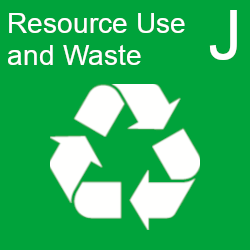Notice: From 01 December 2025, the Outcome Indicator Framework dashboard has been moved. Future updates to this publication are available on GOV.UK at: Environmental Indicator Framework.
Short Description
This indicator shows changes in municipal waste recycling rates in England. The municipal waste recycling rate is the fraction of household waste and waste similar in nature and composition to household waste, which is recycled. The indicator reflects levels of everyday waste that is recycled and not sent for final disposal. Development of the Defra ‘waste tracking’ tool and further integration with data collected by local authorities will close some of the data gaps and enable collection of more comprehensive data.
Readiness and links to data
An interim indicator is presented here that shows trends in ‘household waste’ and ‘waste from households’ recycling rates. These waste data are already published annually as Accredited Official Statistics. Further development is required to include waste that is similar in nature and composition to household waste such as non-household municipal waste. Information is available about the development of Defra’s ‘waste tracking’ tool.
Indicator components
Figure J3: ‘Household waste’ and ‘waste from households’ recycling rates in England, 2000/2001 to 2023/2024
Table J3: ‘Household waste’ and ‘waste from households’ recycling rates in England, 2000/2001 to 2023/2024
| Year | Household waste recycling rate (2000/2001 to 2010/2011) | Waste from households recycling rate (2010/2011 to 2023/2024) |
|---|---|---|
| 2000/2001 | 11.20 | - |
| 2001/2002 | 12.50 | - |
| 2002/2003 | 14.50 | - |
| 2003/2004 | 17.80 | - |
| 2004/2005 | 22.50 | - |
| 2005/2006 | 26.70 | - |
| 2006/2007 | 30.90 | - |
| 2007/2008 | 34.50 | - |
| 2008/2009 | 37.60 | - |
| 2009/2010 | 39.70 | - |
| 2010/2011 | 41.50 | 41.90 |
| 2011/2012 | - | 43.30 |
| 2012/2013 | - | 43.90 |
| 2013/2014 | - | 44.50 |
| 2014/2015 | - | 44.70 |
| 2015/2016 | - | 44.40 |
| 2016/2017 | - | 45.10 |
| 2017/2018 | - | 44.80 |
| 2018/2019 | - | 45.10 |
| 2019/2020 | - | 45.50 |
| 2020/2021 | - | 43.90 |
| 2021/2022 | - | 44.10 |
| 2022/2023 | - | 43.30 |
| 2023/2024 | - | 44.00 |
Trend description for J3
In the 2023/2024 financial year, the recycling rate for ‘waste from households’ was 44.0%, up 2.1 percentage points on the equivalent figure for 2010/2011 (when the measure was first reported).
Assessment of change
In 2011, there was a change in the methodology used to produce the municipal waste recycling rates interim indicator. As this was not directly comparable to the previous method, this indicator only assesses trends using data following the new method.
Over the long-term assessment period (2010/2011 to 2023/2024), an increase (improvement) was observed for waste from households recycling rate. Over the medium-term assessment period (2013/2014 to 2023/2024), little or no change was observed, and over the short-term assessment period (2018/2019 to 2023/2024) a decrease (deterioration) was observed.
Change since 2018 was also assessed. From 2017/2018 to 2023/2024, a decrease (deterioration) was observed for waste from households recycling rate.
Further information on this assessment, along with details on the methodology, is provided in the Assessment background page. Summaries by 25 Year Environment Plan goal and information on indicator links are presented in the Assessment results pages.
Table J3: Assessment of change
| Component | Subcomponent | Period | Date range | Percentage change | Smoothing function | Assessment of change |
|---|---|---|---|---|---|---|
| J3 | Waste from households recycling rate | Short term | 2018/2019 to 2023/2024 | -3.35 | Loess | Deterioration |
| J3 | Waste from households recycling rate | Medium term | 2013/2014 to 2023/2024 | -1.71 | Loess | Little or no change |
| J3 | Waste from households recycling rate | Long term | 2010/2011 to 2023/2024 | 3.53 | Loess | Improvement |
Note that assessment categories were assigned based on smoothed data, so percentage change figures in Table J3 may differ from unsmoothed values quoted elsewhere. Percentage change refers to the difference seen between the first and last years in the specified date range.

